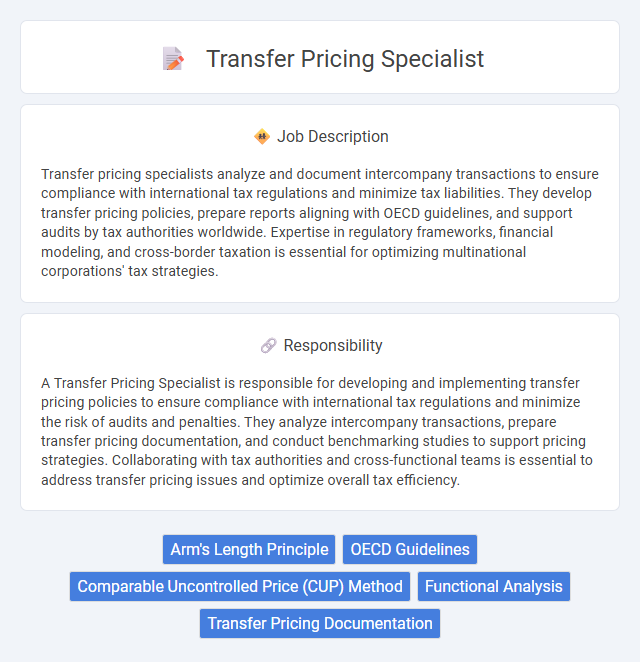
Transfer pricing specialists analyze and document intercompany transactions to ensure compliance with international tax regulations and minimize tax liabilities. They develop transfer pricing policies, prepare reports aligning with OECD guidelines, and support audits by tax authorities worldwide. Expertise in regulatory frameworks, financial modeling, and cross-border taxation is essential for optimizing multinational corporations' tax strategies.
Individuals with strong analytical skills and attention to detail are likely suitable for a Transfer Pricing Specialist role, as the job involves complex financial data evaluation and regulatory compliance. Candidates who are comfortable working under pressure and possess effective communication abilities may have a higher probability of succeeding in this position, given the need to explain transfer pricing policies to diverse stakeholders. Those who struggle with precise data analysis or lack adaptability to ever-changing tax laws might find this role challenging.
Qualification
A Transfer Pricing Specialist requires strong expertise in international tax laws, economics, and accounting principles, often supported by a degree in finance, economics, or law. Professional certifications such as CPA, ACCA, or Chartered Tax Advisor enhance credibility and demonstrate advanced knowledge in transfer pricing regulations and compliance. Proficiency in data analysis, financial modeling, and familiarity with OECD guidelines ensures accurate valuation of intercompany transactions and risk management.
Responsibility
A Transfer Pricing Specialist is responsible for developing and implementing transfer pricing policies to ensure compliance with international tax regulations and minimize the risk of audits and penalties. They analyze intercompany transactions, prepare transfer pricing documentation, and conduct benchmarking studies to support pricing strategies. Collaborating with tax authorities and cross-functional teams is essential to address transfer pricing issues and optimize overall tax efficiency.
Benefit
Transfer pricing specialists likely enhance multinational companies' compliance with tax regulations by accurately setting intercompany prices, reducing the risk of audits and penalties. They may optimize tax liabilities and improve financial reporting accuracy, contributing to better corporate financial health. Their expertise probably supports strategic decision-making in global business operations, potentially increasing overall profitability.
Challenge
Transfer pricing specialists likely face complex challenges in navigating diverse international tax regulations and ensuring compliance across multiple jurisdictions. They probably need to analyze intricate financial data and develop strategies that minimize tax risks while maintaining arm's length standards. The role may also require ongoing adaptation to regulatory changes and collaboration with various stakeholders to address potential disputes and audits.
Career Advancement
Transfer pricing specialists play a crucial role in multinational corporations by ensuring compliance with tax regulations and optimizing financial strategies across borders. Career advancement in this field is marked by progression from analyst roles to senior specialist, manager, and ultimately director positions, often requiring expertise in international tax laws and strong analytical skills. Mastery of transfer pricing documentation, audit defense strategies, and experience with global tax authorities significantly enhances opportunities for leadership roles and consultancy positions.
Key Terms
Arm's Length Principle
A Transfer Pricing Specialist ensures compliance with the Arm's Length Principle by analyzing intercompany transactions to determine appropriate pricing that reflects market conditions between unrelated parties. They perform detailed financial benchmarking studies and documentation to avoid tax penalties and double taxation risks. Expertise in international tax regulations and OECD guidelines is crucial for accurate transfer pricing strategies.
OECD Guidelines
A Transfer Pricing Specialist ensures compliance with OECD Transfer Pricing Guidelines by analyzing intercompany transactions to establish arm's length pricing. Expertise in OECD methods, such as the Comparable Uncontrolled Price (CUP) and Transactional Net Margin Method (TNMM), is critical for preparing documentation that mitigates transfer pricing risks and avoids tax penalties. Mastery of international regulations and country-specific adjustments supports multinational corporations in optimizing tax positions and maintaining regulatory compliance.
Comparable Uncontrolled Price (CUP) Method
A Transfer Pricing Specialist leverages the Comparable Uncontrolled Price (CUP) Method to determine arm's length prices by comparing controlled transactions with comparable uncontrolled transactions between unrelated parties. Expertise in analyzing transaction comparability factors, such as product characteristics, contractual terms, and economic circumstances, ensures accurate pricing under tax regulations and minimizes transfer pricing risks. Proficiency in data collection, benchmarking studies, and regulatory compliance facilitates effective documentation and defense of transfer pricing policies.
Functional Analysis
A Transfer Pricing Specialist conducts detailed Functional Analysis to evaluate the roles, risks, and assets of related entities in cross-border transactions. This analysis ensures compliance with OECD guidelines by identifying value drivers and aligning intercompany pricing with economic substance. Mastery of financial data interpretation and regulatory frameworks is essential for accurate allocation of profits and risk assessment.
Transfer Pricing Documentation
Transfer pricing specialists are responsible for preparing and analyzing transfer pricing documentation to ensure compliance with local and international tax regulations, including BEPS Action 13 requirements. They gather financial data, benchmark studies, and intercompany transaction details to create robust documentation that supports arm's length pricing policies. Expertise in local tax laws and OECD guidelines is crucial to minimize risks of audits and penalties while optimizing tax efficiency for multinational corporations.
 kuljobs.com
kuljobs.com